| Listing 1 - 10 of 10 |
Sort by
|
Book
ISBN: 2729834427 9782729834425 Year: 2007 Publisher: Paris: Ellipses,
Abstract | Keywords | Export | Availability | Bookmark
 Loading...
Loading...Choose an application
- Reference Manager
- EndNote
- RefWorks (Direct export to RefWorks)
Survenance (Philosophie) --- Épistémologie. --- Tout et parties (Philosophie) --- Émergence (philosophie) --- Philosophie des sciences --- Sciences de la vie
Book
ISBN: 2895443386 1435698835 9781435698833 9782895443384 Year: 2007 Publisher: Quebec City, Quebec : Editions MultiMondes,
Abstract | Keywords | Export | Availability | Bookmark
 Loading...
Loading...Choose an application
- Reference Manager
- EndNote
- RefWorks (Direct export to RefWorks)
Evolution. --- Biodiversity. --- Biological diversification --- Biological diversity --- Biotic diversity --- Diversification, Biological --- Diversity, Biological --- Biology --- Biocomplexity --- Ecological heterogeneity --- Numbers of species --- Philosophy --- Creation --- Emergence (Philosophy) --- Teleology
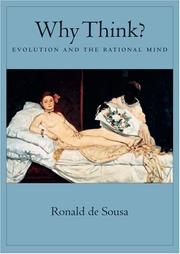
ISBN: 9780195189858 019518985X 0199868379 0199861587 9786611159030 1281159034 0198040938 1435618688 Year: 2007 Publisher: Oxford Oxford University Press
Abstract | Keywords | Export | Availability | Bookmark
 Loading...
Loading...Choose an application
- Reference Manager
- EndNote
- RefWorks (Direct export to RefWorks)
Theory of knowledge --- Evolution. --- Knowledge, Theory of. --- Reasoning. --- Evolution --- Knowledge, Theory of --- Reasoning --- Argumentation --- Ratiocination --- Reason --- Thought and thinking --- Judgment (Logic) --- Logic --- Epistemology --- Philosophy --- Psychology --- Creation --- Emergence (Philosophy) --- Teleology
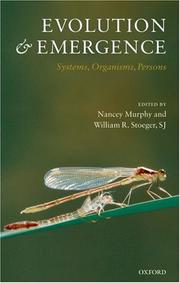
ISBN: 1281148784 9786611148782 0191525464 1429492740 9780191525469 9780199204717 0199204713 9781281148780 6611148787 9781429492744 1383034400 Year: 2007 Publisher: Oxford ; New York : Oxford University Press,
Abstract | Keywords | Export | Availability | Bookmark
 Loading...
Loading...Choose an application
- Reference Manager
- EndNote
- RefWorks (Direct export to RefWorks)
'Evolution and Emergence' is a collection of essays by experts in the field, exploring how nature works to produce systems of increasing complexity from simple components, and how our understanding of this phenomenon of emergence can lead us to a deeper appreciation of both our humanity and our relationship to God.
Emergence (Philosophy) --- Science --- Normal science --- Philosophy of science --- Emergent evolution (Philosophy) --- Emergent laws (Philosophy) --- Emergent philosophy --- Emergent properties (Philosophy) --- Emergent structure (Philosophy) --- Emergentism (Philosophy) --- Philosophy --- Complexity (Philosophy) --- Evolution --- Philosophy. --- Science - Philosophy.
Book
ISBN: 9783451293894 3451293897 Year: 2007 Publisher: Freiburg Herder
Abstract | Keywords | Export | Availability | Bookmark
 Loading...
Loading...Choose an application
- Reference Manager
- EndNote
- RefWorks (Direct export to RefWorks)
231.51 --- De Deo creatore. Schepping --- Creation. --- Creationism. --- Evolution. --- 231.51 De Deo creatore. Schepping --- Creation --- Creationism --- Evolution --- Philosophy --- Emergence (Philosophy) --- Teleology --- Creation science --- Scientific creationism --- Modernist-fundamentalist controversy --- Bible and evolution --- Evolution (Biology) --- Intelligent design (Teleology) --- Biblical cosmogony --- Cosmogony --- Natural theology --- Beginning --- Biblical cosmology --- Creation windows --- Religious aspects --- Christianity
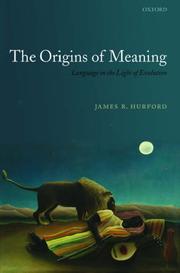
ISBN: 9780199207855 0199207852 9786611149079 0191525928 1281149071 1435609794 0191607231 9780191525926 6611149074 Year: 2007 Publisher: Oxford : Oxford University Press,
Abstract | Keywords | Export | Availability | Bookmark
 Loading...
Loading...Choose an application
- Reference Manager
- EndNote
- RefWorks (Direct export to RefWorks)
In this, the first of two ground-breaking volumes on the nature of language in the light of the way it evolved, James Hurford looks at the origins of meaning and of its expression in language and reviews a mass of evidence to uncover the evolutionary path between the non-speaking minds of apes and our own speaking minds. This is a landmark contribution to the understanding of linguistic and thinking processes, and the fullest account yet published of the evolution of language and. communication. - ;In this, the first of two ground-breaking volumes on the nature of language in the light of the
Communication. --- Evolution. --- Semantics --- History. --- Lexicology. Semantics --- Mass communications --- 800 --- 801.56 --- 801.56 Syntaxis. Semantiek --- Syntaxis. Semantiek --- 800 Taalwetenschap. Taalkunde. Linguistiek --- Taalwetenschap. Taalkunde. Linguistiek --- Communication --- Evolution --- Formal semantics --- Semasiology --- Semiology (Semantics) --- Comparative linguistics --- Information theory --- Language and languages --- Lexicology --- Meaning (Psychology) --- Philosophy --- Creation --- Emergence (Philosophy) --- Teleology --- Communication, Primitive --- Mass communication --- Sociology --- History
Book
ISBN: 9783867440189 3867440182 Year: 2007 Publisher: Augsburg: Sankt Ulrich,
Abstract | Keywords | Export | Availability | Bookmark
 Loading...
Loading...Choose an application
- Reference Manager
- EndNote
- RefWorks (Direct export to RefWorks)
Philosophy of nature --- Evolution. Phylogeny --- Christian dogmatics --- Evolution --- Creation --- Intelligent design (Teleology) --- Religious aspects --- Catholic Church --- #GGSB: Dogmatiek --- #GGSB: Schepping --- 215 --- Godsdienst en wetenschap --- Design, Intelligent (Teleology) --- Natural theology --- Teleology --- Creationism --- God --- Philosophy --- Emergence (Philosophy) --- Proof, Teleological --- Creation. --- Dogmatik. --- Evolution. --- Evolutionstheorie. --- Intelligent design (Teleology). --- Katholische Theologie. --- Schöpfung. --- Schöpfungslehre. --- Catholic Church. --- Castel Gandolfo <2006>. --- Dogmatiek --- Schepping --- Evolution - Religious aspects - Catholic Church - Congresses --- Creation - Congresses --- Intelligent design (Teleology) - Congresses
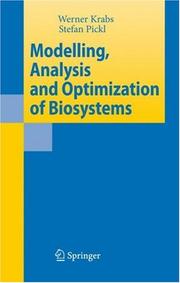
ISBN: 1281066362 9786611066369 3540714537 3540714529 3642090664 Year: 2007 Publisher: Berlin ; New York : Springer,
Abstract | Keywords | Export | Availability | Bookmark
 Loading...
Loading...Choose an application
- Reference Manager
- EndNote
- RefWorks (Direct export to RefWorks)
Mathematical models in biology and medicine cannot be based on natural laws as it is the case with physics and chemistry. This is due to the fact that biological and medical processes are concerned with living organisms. Mathematical models, however, can be used as a language by which certain aspects of biological or medical processes can be expressed. In general, several mathematical models can be designed in order to describe a biological or medical process and there is no unique criterion which model gives the best description. This book presents several of these models and shows applications of them to different biological and medical problems. The book shows that operations research expertise is necessary in respect to modeling, analysis and optimization of biosystems.
Biology --- Medicine --- Evolution --- Hemodialysis --- Mathematical models. --- Blood --- Blood dialysis --- Extracorporeal dialysis --- Kidney dialysis --- Renal dialysis --- Dialysis --- Therapeutics --- Philosophy --- Creation --- Emergence (Philosophy) --- Teleology --- Biomathematics --- Biological models --- Filtration --- Cytology --- Operations research. --- Hematology. --- Mathematical and Computational Biology. --- Biological Techniques. --- Operations Research/Decision Theory. --- Control, Robotics, Mechatronics. --- Research --- Methodology. --- Operational analysis --- Operational research --- Industrial engineering --- Management science --- System theory --- Cell biology --- Cellular biology --- Cells --- Cytologists --- Haematology --- Internal medicine --- Diseases --- Biomathematics. --- Biology—Technique. --- Decision making. --- Control engineering. --- Robotics. --- Mechatronics. --- Mathematics --- Mechanical engineering --- Microelectronics --- Microelectromechanical systems --- Automation --- Machine theory --- Control engineering --- Control equipment --- Control theory --- Engineering instruments --- Programmable controllers --- Deciding --- Decision (Psychology) --- Decision analysis --- Decision processes --- Making decisions --- Management --- Management decisions --- Choice (Psychology) --- Problem solving --- Decision making
Book
ISBN: 9782020882132 2020882132 Year: 2007 Publisher: Paris: Seuil,
Abstract | Keywords | Export | Availability | Bookmark
 Loading...
Loading...Choose an application
- Reference Manager
- EndNote
- RefWorks (Direct export to RefWorks)
L'origine de la vie et l'évolution des espèces ont toujours agité les esprits. Certains animaux peuvent-ils surgir du néant, comme le croyaient les adeptes de la génération spontanée? L'homme est-il un produit du hasard et d'une sélection naturelle, comme le pensent aujourd'hui les biologistes darwiniens? Une vague odeur de soufre plane encore sur ces questions difficiles. Un simple coup de pouce d'un créateur omniscient ne suffirait-il pas à les résoudre? La tentation d'hybrider la science et la religion n'est pas nouvelle. Elle motive aujourd'hui des mouvements tels que le créationnisme et, aux États-Unis, l'" Intelligent Design". Présente bien avant Darwin et sa théorie de l'évolution, elle resurgit régulièrement tel un infatigable serpent de mer. Chacune de ses réapparitions est l'occasion d'opposer à nouveau la raison et la foi, deux domaines moins étanches qu'on ne le croit - en tout cas assez équitablement visités par les vieux démons de l'intolérance.
Evolution (Biology) --- Creationism --- Evolution (Biologie) --- Créationnisme --- Darwinisme --- Creationnisme --- --Religion --- --Science --- --Creationism --- Evolution --- Evolution and the Bible --- 7608 --- Religious aspects --- Christianity --- Bible and evolution. --- Évolutionnisme --- Créationnisme (théologie) --- Creationism. --- Evolution and the Bible. --- Anti-evolutionism --- Antievolutionism --- Creation science --- Scientific creationism --- Modernist-fundamentalist controversy --- Bible and evolution --- Creation --- Intelligent design (Teleology) --- Christianity. --- Biblical teaching --- Créationnisme --- Philosophy --- Emergence (Philosophy) --- Teleology --- Animal evolution --- Animals --- Biological evolution --- Darwinism --- Evolutionary biology --- Evolutionary science --- Origin of species --- Biology --- Biological fitness --- Homoplasy --- Natural selection --- Phylogeny --- Religious aspects&delete& --- Darwinisme. --- Évolutionnisme. --- --Creationnisme --- Religion --- Science --- Evolution - Religious aspects - Christianity --- Evolution (Biology) - Religious aspects - Christianity --- darwin --- intelligent design --- créationnisme
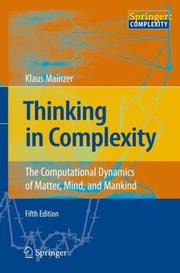
ISBN: 1281067377 9786611067373 3540722289 3540722270 3642446566 Year: 2007 Publisher: Berlin ; London : Springer,
Abstract | Keywords | Export | Availability | Bookmark
 Loading...
Loading...Choose an application
- Reference Manager
- EndNote
- RefWorks (Direct export to RefWorks)
The theory of nonlinear, complex systems has become by now a proven problem-solving approach in the natural sciences. It is also recognized that many, if not most, of our social, ecological, economical and political problems are essentially of a global, complex and nonlinear nature. And it is now further accepted than any holistic perspective of the human mind and brain can hardly be achieved by any other approach. In this wide-ranging, scholarly but very concise treatment, Klaus Mainzer (physicist, computer scientist and philosopher) discusses, in essentially nontechnical language, the common framework behind these ideas and challenges. Emphasis is given to the evolution of new structures in natural and cultural systems, and we are lead to see clearly how the new integrative approach can give insights not available from traditional reductionistic methods. The fifth edition enlarges and revises almost all sections and include an entirely new chapter on the complexity of economic systems. From the reviews of the fourth edition: "… this highly recommended book is a wonderful resource for intuitive basic ideas in the need of rigorous formulation." (Albert A. Mullin, Zentralblatt MATH) "This book is ambitious, incredibly erudite with 22 pages of references, and is indisputably clearly and beautifully written and illustrated. It is perfectly suited to a first course on the science of complexity. Even beginners and young graduate students will have something to learn from this book." (André Hautot, Physicalia) "Readers of this book will enjoy Mainzer’s exposition, which is based on a tight coupling between classical and historical concepts from Plato and Aristotle to modern, mathematical and physical developments … . takes pains to point out essential differences between classical science and the science of complexity. … Thinking in Complexity is an outstandingly readable book." (Anutosh Moitra, The Industrial Physicist).
Science --- Complexity (Philosophy) --- Nonlinear theories. --- Philosophy. --- Nonlinear problems --- Nonlinearity (Mathematics) --- Calculus --- Mathematical analysis --- Mathematical physics --- Philosophy --- Emergence (Philosophy) --- Normal science --- Philosophy of science --- Science (General). --- Philosophy (General). --- Artificial intelligence. --- Bioinformatics. --- Popular Science, general. --- Philosophy of Science. --- Complex Systems. --- Philosophy, general. --- Artificial Intelligence. --- Bio-informatics --- Biological informatics --- Biology --- Information science --- Computational biology --- Systems biology --- AI (Artificial intelligence) --- Artificial thinking --- Electronic brains --- Intellectronics --- Intelligence, Artificial --- Intelligent machines --- Machine intelligence --- Thinking, Artificial --- Bionics --- Cognitive science --- Digital computer simulation --- Electronic data processing --- Logic machines --- Machine theory --- Self-organizing systems --- Simulation methods --- Fifth generation computers --- Neural computers --- Data processing --- Popular works. --- Philosophy and science. --- Statistical physics. --- Dynamical systems. --- Mental philosophy --- Humanities --- Dynamical systems --- Kinetics --- Mathematics --- Mechanics, Analytic --- Force and energy --- Mechanics --- Physics --- Statics --- Mathematical statistics --- Science and philosophy --- Statistical methods
| Listing 1 - 10 of 10 |
Sort by
|

 Search
Search Feedback
Feedback About UniCat
About UniCat  Help
Help News
News